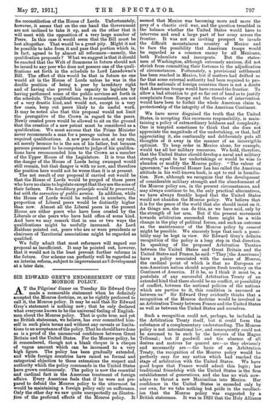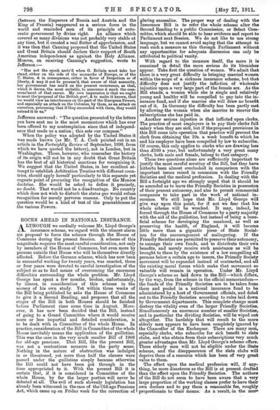SIR EDWARD GREY'S ENDORSEMENT OF THE MONROE POLICY.
AT the Pilgrims' dinner on Tuesday Sir Edward Grey made a memorable statement when he definitely accepted the Monroe doctrine, or, as he rightly preferred to call it, the Monroe policy. It may be said that Sir Edward Grey's statement is nothing new ; that he only declared what everyone knows to be the universal feeling of English- men about the Monroe policy. That is quite true, and yet no British statesman, we believe, has ever committed him- self in such plain terms and without any caveats or limita- tions to an acceptance of the policy. That he should have done so is a proof of the unreserved confidence between Great Britain and the United States. For the Monroe policy, be it remembered, though not a blank cheque is a cheque of vague amount which can be increased to a very high figure. The policy has been gradually extended, and while foreign countries have raised no formal and categorical objection to these extensions the respect and authority which the policy commands in the United States have grown continuously. The policy is now the essential and cardinal fact in the American treatment of foreign affairs. Every American feels that if he were not pre- pared to defend the Monroe policy to the uttermost he would be maintaining a foreign policy only on sufferance. Only the other day we saw quite unexpectedly an illustra- tion of the profound effects of the Monroe policy. It seemed that Mexico was becoming more and more the prey of a chaotic civil war, and the question trembled in the balance whether the United States would have to intervene and send a large part of her army across the frontier. It was not an inviting prospect to invade the difficult mountainous country of Mexico and to face the possibility that American troops would be regarded as a common enemy by all Mexicans, both Federalists and insurgents. But the states- men of Washington, although extremely anxious, did not shrink from committing their fortunes to the adjudication of circumstances. Fortunately, a provisional settlement has been reached in Mexico, but if matters had drifted so far that some external authority had been required to pro- tect the nationals of foreign countries there is not a doubt that American troops would have crossed the frontier. To allow a bad situation to get so far out of hand as to justify complaints from Europe and the threats of intervention would have been to forfeit the whole American claim to protectorship of the integrity of the American Continent.
We have never disguised the truth that the United States, in accepting this enormous responsibility, is main- taining a policy of extraordinary boldness and complexity. One is tempted sometimes to think that she does not appreciate the magnitude of the undertaking, or that, half appreciating it, she continually and deliberately puts all thoughts of it away in the manner of an incorrigible optimist. To keep order in Mexico alone, for example, would tax all her military resources. We hold, therefore, that the United States should develop a naval and military strength equal to her undertakings or would be wise to abandon or modify the Monroe policy. " The valour of ignorance," as General Homer Lea has called the American attitude in his well-known book, is apt to end in humilia- tion. Now, although we recognize that the development of considerable military strength and the abandonment of the Monroe policy are, in the present circumstances, and may always continue to be, the only practical alternatives, we have always frankly hoped that the United States would not abandon the Monroe policy. We believe that it is for the peace of the world that she should insist on it. As things are, she can do this, as we have said, only by the strength of her arm. But if the present movement towards arbitration succeeded there might be a wide change in the play of political forces, and such an outcome as the maintenance of the Monroe policy by consent might be possible. We sincerely hope that such a possi- bility may be kept in view. Sir Edward Grey's definite recognition of the policy is a long step in that direction. In speaking of the proposed Arbitration Treaties between the United States and Great Britain and the United States and France, he said: " They [the Americans] have a policy associated with the name of Monroe, the cardinal point of which is that no European or non-American nation should acquire fresh territory on the Continent of America. If it be, as I think it must be, a postulate of any successful Arbitration Treaty of an extended kind that there should be no conflict, or possibility of conflict, between the national policies of the nations which are parties to it, this condition is assumed as between us." Sir Edward Grey evidently thinks that a recognition of the Monroe doctrine would be involved in an Arbitration Treaty between France and the United States as well as between the United States and ourselves.
Such a recognition could not, perhaps, be included in the Arbitration Treaty itself, but it could form the substance of a complementary understanding. The Monroe policy is not international law, and consequently could not be assumed to be such by the lawyers of the Hague Tribunal ; but if goodwill and the absence of all desires and motives for quarrel are—as they obviously and necessarily are — the basis of an Arbitration Treaty, the recognition of the Monroe policy would be perfectly easy for any nation which had reached the stage of arbitration with the United States. We have good hopes that France would admit this logic ; her traditional friendship with the United States is the firm establishment of generations, and she has no wish now- adays to thrust a new Maximilian into Mexico. Her confidence in the United States is exceeded only by our own, for we take nothing but pride in the recollect- ion that the Monroe policy was suggested by a British statesman. It was in 1823 that the Holy Alliance (between the Emperors of Russia and Austria and the King of Prussia) reappeared as a serious force in the world and reminded men of its principle of auto- cratic government by divine right. An alliance which covered so many divisions was not probably very stable at any time, but it created a real flutter of apprehension, and it was then that Canning proposed that the United States and Great Britain should declare their support of South American independence as against the Holy Alliance. Monroe, on receiving Canning's suggestion, wrote to Jefferson :— " Has not the epoch arriv'd when G. Britain must take her stand, either on the side of the monarchs of Europe, or of the U. States, & in consequence, either in favor of Despotism or of liberty, & may it not be presum'd, that aware of that necessity, her government has seia'd on the present occurrence, as that which it deems, the most suitable, to announce & mark the com- menement of that career. My own impression is that we ought to meet the-proposal of the British govt & to make it known, that we would view an interference on the part of the European Powers, and especially an attack on the Colonies, by them, as an attack on ourselves, presuming that if they succeeded with them, they would extend it to us."
Jefferson answered : " The question presented by the letters you have sent me is the most momentous which has ever been offered to my contemplation since that of independ- ence that made us a nation ; this sets our compass." When the policy was adopted by the United States it was made known (as Mr. T. A. Cook pointed out in an article in the Fortnightly Review of September, 1898, from which we have quoted the letters), not in London, but in Washington. Those, however, who remember the history of its origin will not be in any doubt that Great Britain has the best of all historical sanctions for recognizing it. We suggest that the United States, in her excellent at- tempt to establish Arbitration Treaties with different coun- tries, should apply herself particularly to this separate yet cognate point of procuring the recognition of the Monroe doctrine. She would be asked to define it precisely, no doubt. That would not be a disadvantage. No country which does not wish to disturb the stains guo would refuse recognition for merely perverse reasons. Only to put the question would be a kind of test of the peaceableness of the various Powers.











































 Previous page
Previous page